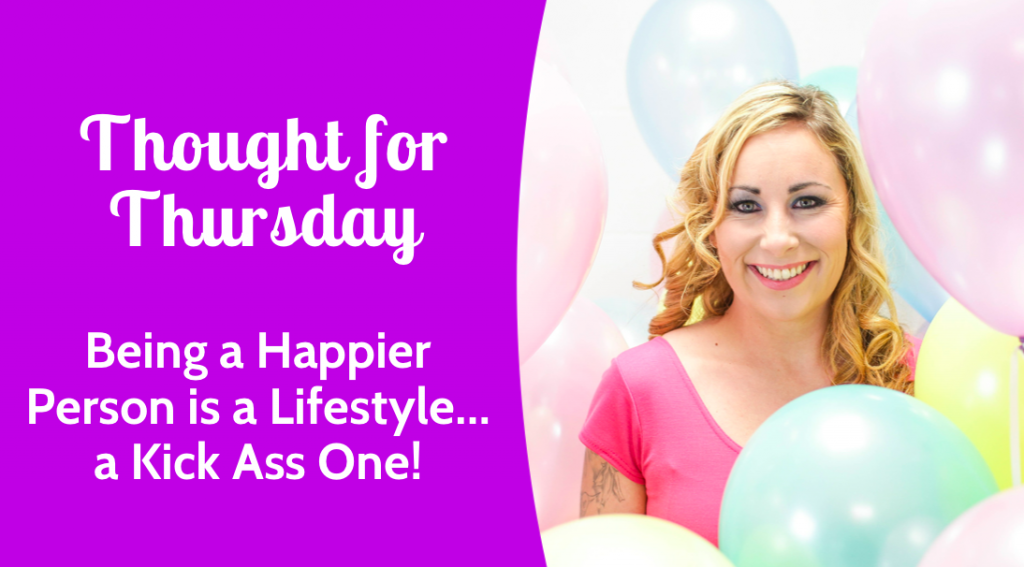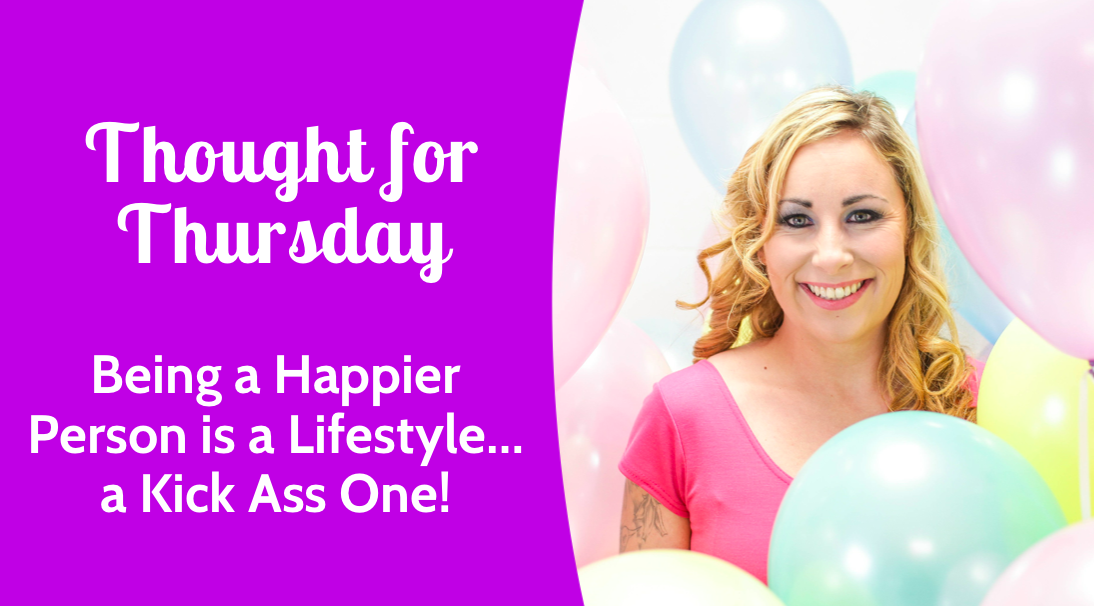
Thought for Thursday: Being a happier person is a lifestyle… a Kick Ass one!
Thought for Thursday | VLCD Blog
Being a happier person is a lifestyle… a Kick Ass one!

There are many different articles, blogs, and journals written by people who suggest how we as humans operate with regards to positivity and if I am honest by the time I get to the end of listening to them I am more negative than ever before. They are either complex beyond reason or imply in a very cold manner that all that is wrong with me is a deep seated problem that will never be overcome.
Then I came across as video by someone by the name of Tali Sharot that changed everything on its head. This simplifies the way we think about our lives to the most rudimentary level. This may be a personal bias based on my way of thinking but she spoke so much sense it was like this was made for me.
What was great about this is her video explains negative thinking not only on a personal level but also on a social level which is where I think many of our personal self-perceptions come from.
At the start of the video she said something to me that made me immediately think this is a professional with no clue what actually goes on in my head, she said – [quote]It’s our tendency to overestimate our likelihood of experiencing good events in our lives and underestimate our likelihood of experiencing bad events. So we underestimate our likelihood of suffering from cancer, being in a car accident. We overestimate our longevity, our career prospects. In short, we’re more optimistic than realistic, but we are oblivious to the fact.[/quote]
Well to say that she missed the mark here was an understatement. I am person that handles failure fairly very poorly even though I still secretly consider myself to be a person that tries quite hard. I am the person that if say are you on a diet I will most likely say no even if I am currently succeeding in one, just because there is every chance in my mind that I may fail. This is the part where she changes direction and summed me up in just a couple of sentences, Tali said, ‘Some people say the secret to happiness is low expectations. I think the logic goes something like this: If we don’t expect greatness, if we don’t expect to find love and be healthy and successful, well we’re not going to be disappointed when these things don’t happen. And if we’re not disappointed when good things don’t happen, and we’re pleasantly surprised when they do, we will be happy.’
Now this is where I was like… hey she gets me! At this juncture it appears I am actually heading in the wrong direction with this but give me a second. The reason I am sharing this is because I see these same elements in so many people who I have grown to be friends with through this diet.
She goes on to say the following, [quote] So it’s a very good theory, but it turns out to be wrong for three reasons. Number one: Whatever happens, whether you succeed or you fail, people with high expectations always feel better. Because how we feel when we get dumped or win employee of the month depends on how we interpret that event.
The psychologists Margaret Marshall and John Brown studied students with high and low expectations. And they found that when people with high expectations succeed, they attribute that success to their own traits. “I’m a genius, therefore I got an A, therefore I’ll get an A again and again in the future.” When they failed, it wasn’t because they were dumb, but because the exam just happened to be unfair. Next time they will do better. People with low expectations do the opposite. So when they failed it was because they were dumb, and when they succeeded it was because the exam just happened to be really easy. Next time reality would catch up with them. So they felt worse[/quote]
I am now really intrigued because not only did she hit the nail on the head but spookily she did it using an example of a scenario that actually applied to me. Passing my exams was always more to do with luck than skill! More importantly here I get to see the contrast of how ‘other’ people think and this is where it starts to get my brain thinking. Mr reasoning at this point is that if it is ok for other people to think like that and actually benefit from it then why can’t I?
As Tali moves onto the second point here there is even more good news…
[quote]Number two: Regardless of the outcome, the pure act of anticipation makes us happy. The behavioral economist George Lowenstein asked students in his university to imagine getting a passionate kiss from a celebrity, any celebrity. Then he said, “How much are you willing to pay to get a kiss from a celebrity if the kiss was delivered immediately, in three hours, in 24 hours, in three days, in one year, in 10 years? He found that the students were willing to pay the most not to get a kiss immediately, but to get a kiss in three days. They were willing to pay extra in order to wait. Now they weren’t willing to wait a year or 10 years; no one wants an aging celebrity. But three days seemed to be the optimum amount.
So why is that? Well if you get the kiss now, it’s over and done with. But if you get the kiss in three days, well that’s three days of jittery anticipation, the thrill of the wait. The students wanted that time to imagine where is it going to happen, how is it going to happen. Anticipation made them happy.
This is, by the way, why people prefer Friday to Sunday. It’s a really curious fact, because Friday is a day of work and Sunday is a day of pleasure, so you’d assume that people will prefer Sunday, but they don’t. It’s not because they really, really like being in the office and they can’t stand strolling in the park or having a lazy brunch. We know that, because when you ask people about their ultimate favorite day of the week, surprise, surprise, Saturday comes in at first, then Friday, then Sunday. People prefer Friday because Friday brings with it the anticipation of the weekend ahead, all the plans that you have. On Sunday, the only thing you can look forward to is the work week.
So optimists are people who expect more kisses in their future, more strolls in the park. And that anticipation enhances their wellbeing. In fact, without the optimism bias, we would all be slightly depressed. People with mild depression, they don’t have a bias when they look into the future. They’re actually more realistic than healthy individuals. But individuals with severe depression, they have a pessimistic bias. So they tend to expect the future to be worse than it ends up being.[/quote]
In her second point her Tali really nailed the way my own fears work and it again is so painfully simple to see what the difference is here. I would go even further and say at this point that I cannot change the future, but I sure can change the way I think about the future. Dealing with the first point in my opinion plays heavily into succeeding here. Having the belief in yourself and your abilities means that you are going to be more confident about how you handle the future and therein will believe in a brighter future. I may be overweight this month but next month I am going to be fitter and healthier, and every month after that until I am a lean machine!…
This brings me to the last part of the speech I want to share with you and that is, [quote]optimism changes subjective reality. The way we expect the world to be changes the way we see it. But it also changes objective reality. It acts as a self-fulfilling prophecy. And that is the third reason why lowering your expectations will not make you happy. Controlled experiments have shown that optimism is not only related to success, it leads to success. Optimism leads to success in academia and sports and politics. And maybe the most surprising benefit of optimism is health. If we expect the future to be bright, stress and anxiety are reduced.
So what we would really like to do, is we would like to protect ourselves from the dangers of optimism, but at the same time remain hopeful, benefiting from the many fruits of optimism. And I believe there’s a way for us to do that. The key here really is knowledge. We’re not born with an innate understanding of our biases. These have to be identified by scientific investigation. But the good news is that becoming aware of the optimism bias does not shatter the illusion.’[/quote]
Think of the number of times you have had a day where no matter what happened you were able to keep going, keep being happy and keep succeeding and knowing it was all down to maybe just that one thing in your life that let you see the ‘brighter side’ of life. The key therefore is to take note of all your success, all the graces and positive things in your life and know that without you they would not exist. At the same time embrace the fact that the things that don’t go according to plan are lessons learned, often influenced by factors that are out of your control and are still a positive part in forming who you are!
With a diet this is more true than ever. You are making the decision to make changes, committing to the results and even if you face a set back there is always the chance to bring it back and forge a new path. One chosen by you the suits you. Nothing on this earth stands in your way other than you! Make every day that day where no matter what happens you are still the awesome person you were the day before and the person you will be tomorrow 🙂
Thanks for reading, I would love to hear your thoughts below.
[box type=”download” size=”large” style=”rounded” border=”full”]Comment below:[/box]
Kind regards
Grant





